|
|
|
Sort Order |
|
|
|
Items / Page
|
|
|
|
|
|
|
| Srl | Item |
| 1 |
ID:
088059
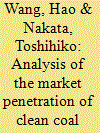

|
|
|
|
|
| Publication |
2009.
|
| Summary/Abstract |
This paper discusses policy instruments for promoting the market penetration of clean coal technologies (CCTs) into China's electricity sector and the evaluation of corresponding effects. Based on the reality that coal will remain the predominant fuel to generate electricity and conventional pulverized coal boiler power plants have serious impacts on environment degradation, development of clean coal technologies could be one alternative to meet China's fast growing demand of electricity as well as protect the already fragile environment. A multi-period market equilibrium model is applied and an electricity model of China is established to forecast changes in the electricity system up to 2030s. Three policy instruments: SO2 emission charge, CO2 emission charge and implementing subsidies are considered in this research. The results show that all instruments cause a significant shift in China's electricity structure, promote CCTs' competitiveness and lead China to gain great benefit in both resource saving and environment improvement. Since resource security and environment degradation are becoming primary concerns in China, policies that could help to gain generations' market share of advanced coal-based technologies such as CCTs' is suitable for the current situation of China's electricity sector.
|
|
|
|
|
|
|
|
|
|
|
|
|
|
|
|
| 2 |
ID:
094264


|
|
|
|
|
| Publication |
2010.
|
| Summary/Abstract |
This research assesses to what extent current Dutch energy transition policy instruments for the existing housing stock can fulfil local executive actors' needs and instigate adoption of energy efficiency measures by them. This is done by studying energy policy instruments for the existing housing stock in the Netherlands and in other European countries, and by an empirical research, which analyses barriers and needs of local executive actors. We found that, despite current Dutch energy transition policy instruments for the existing housing stock seem to fulfil local executive actors' needs to a large extent, complementary policy instruments are needed to stimulate and pressure the incumbent renovation regime. A long-term oriented financial rewarding system is needed to build up a structural market for the deployment of renewables, to increase the number of specialist jobs in the building sector, and to stimulate the development of integrated, standardized, building components. Furthermore, a long-term oriented financial rewarding system for energy efficiency investments in housing renovation projects, and a low VAT rate applied to energy efficient renovation measures, are needed. Finally, enforcement possibilities and sanctions (fines) should become an integrative part of Dutch energy certification regulation to make the certificate become part of a value chain
|
|
|
|
|
|
|
|
|
|
|
|
|
|
|
|
| 3 |
ID:
097439


|
|
|
|
|
| Publication |
2010.
|
| Summary/Abstract |
Promoting energy efficiency in the building sector is essential if the agreements of the Kyoto Protocol are to be honoured. Different initiatives for energy labelling of highly energy-efficient residential buildings have emerged throughout Europe as an essential method to stimulate market demand, to control grants or to ensure the quality of demonstration projects with excellent energy performance.
The paper identifies the barriers and opportunities for the further diffusion of labels for highly energy-efficient houses. A model based on the theory of the diffusion of innovation is developed to analyse perceived attributes of existing European labels. The paper investigates the innovation characteristics of existing labels in Europe, with a focus on advanced countries. The question of compatibility with the development of the European Energy Performance of Buildings Directive (EPBD) is examined in detail.
We found that the diffusion of emerging and already existing voluntary European labels for highly energy-efficient houses is needed. Their complexity can be lowered and relative advantage, trialability, observability, and compatibility can be increased. EPBD calculation procedures should be able to receive highly energy-efficient houses. In the framework of the recast of the EPBD, official recognition of existing voluntary labels is recommended.
|
|
|
|
|
|
|
|
|
|
|
|
|
|
|
|
| 4 |
ID:
162309
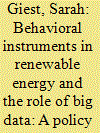

|
|
|
|
|
| Summary/Abstract |
There has been a surge in the application of behavioral insights for environmental policymaking. It is often presented as an easy and low-cost intervention to alter individual behavior. However, there is limited insight into the cost effectiveness of these attempts and the impact of inserting behavioral policy instruments into an existing mix of traditional tools in a particular policy sector. Furthermore, there has been little focus on the intersection of large behavioral datasets and how they could complement behavioral insights. We present a conceptual overview of how the intersection of big data and behavioral knowledge would work in the renewable energy sector. We indicate that inserting behavioral insights into the energy instrument mix is complex due to technological trajectories, path dependencies and resistance from incumbent industries to change production patterns. We also highlight the underutilized role of large behavioral datasets that can inform not only policy implementation, but also policy design and evaluation efforts. Drawing on these findings, we introduce future research streams of government capacity in combining behavioral insights and data, the compatibility of this information with existing policy instruments and how this affects policy change.
|
|
|
|
|
|
|
|
|
|
|
|
|
|
|
|
| 5 |
ID:
162945
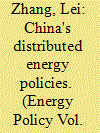

|
|
|
|
|
| Summary/Abstract |
Distributed energy (DE) is a way to cascade energy use near multiple users. It significantly impacts energy savings, emission reductions and energy structure upgrades. In recent years, all levels of the Chinese government have strived to introduce policies favorable to the implementation of DE. These policies have been affected by the timing of the introduction, regional economic differences, the degree of government attention, and many other complex factors. To clarify the development and links between these policies, this study summarizes and compares China's DE policies at national, provincial, and municipal levels, from 1989 to 2016. We analyze the scope and content of subsidies in detail, and then provide policy recommendations for DE development in China. The main results are as follows: (1) DE policies emerge from legal provisions in the areas of energy, electricity, and environmental protection. The policies have gradually evolved from macro-plans to specific guidance. (2) The demand for DE subsidies is increasing, making the back slope of subsidies significant under an insufficient government budget. Diverse subsidies are needed to address this contradiction. (3) Future policies should focus on comprehensive DE utilization, smart grids, research and development (R&D), and developing policy synergies at different levels.
|
|
|
|
|
|
|
|
|
|
|
|
|
|
|
|
| 6 |
ID:
137663


|
|
|
|
|
| Summary/Abstract |
Electricity generated by renewable energies (RES-E) already accounts for 25% of Germany’s electricity supply. This has led to recent discussions for a better market integration of RES-E. The paper examines how competing actors and their ideas on market integration developed new services for direct marketing according to their respective origins and tried to shape the regulatory framework. The paper analyses this process and explains the current shape of the field of direct marketing. Medium-sized structured actors, who favoured RES-E integration via the conventional wholesale power markets, and who formed early close coalitions with RES-E power producers at the same time, have been most successful in terms of market shares. Moreover, they have been very successful for different reasons in building-up coalitions with governance units and influencing the field rules and routines. Based on those findings, the paper will conclude with some policy advices for the future adjustment of the current regulative frameworks. As long as there is no evidence of how RES-E can be integrated most effectively and efficiently, policies should maintain a competition between different direct marketing strategies to find out which strategies serve the best in terms of achieving a successful energy transition.
|
|
|
|
|
|
|
|
|
|
|
|
|
|
|
|
| 7 |
ID:
127018
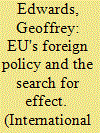

|
|
|
|
|
| Publication |
2013.
|
| Summary/Abstract |
The Lisbon Treaty sought to meet new global challenges by providing the European Union (EU) with stronger institutional capacity and policy instruments to make it a more effective international actor in foreign and security terms. The article sets out the structures and practices agreed and contested by both Member States - especially the United Kingdom and France - and the European Commission, focusing on the roles of the High Representative (HR) for Foreign Affairs and the European External Action Service. It points to the disjuncture between the formal calls for greater coherence and consequence in the EU's foreign policies, the problems of creating an effective policy vehicle and the practices that undermine both its efforts and its legitimacy.
|
|
|
|
|
|
|
|
|
|
|
|
|
|
|
|
| 8 |
ID:
150370


|
|
|
|
|
| Summary/Abstract |
This paper applies a multi-criteria analysis (MCA) to evaluate public policy mechanisms that foster energy efficiency and renewable energy sources in the Greek building sector, based on stakeholders’ understanding and perceptions of the functionality of policy instruments. The objective is to shed light on the implementation of currently employed policy mechanisms that aim to achieve the 2020 energy savings targets and beyond, providing useful information to policy makers for future policy (re-) formulations. In this framework, policy instruments were evaluated against process-related criteria, such as implementation costs, distributional effects, and coherence of policy processes, so as to highlight successful policy practices during their implementation phase as well as to unveil cases of policy underperformance or unintended policy outcomes. To hedge uncertainties related to policy instrument selection, the method employs probabilistic evaluations of every alternative against each criterion. The MCA results showed that the country is still missing significant energy saving opportunities that could be reached through more streamlined implementation practices and political support. In times of fiscal crisis, the Greek government should also revitalize the implementation of alternative funding mechanisms and support policy alternatives such as green public procurement, voluntary agreements, and energy performance contracting.
|
|
|
|
|
|
|
|
|
|
|
|
|
|
|
|
| 9 |
ID:
181894
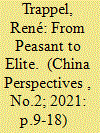

|
|
|
|
|
| Summary/Abstract |
This article contributes to the growing body of research on the role of the Party-state in shaping an emerging post-peasant modernity in rural China, taking developments in Gansu Province as a case. The article first analyses how a political preference for an agrarian elite has been put into recent policies and translates into rural practices. It argues that the “new-type agricultural management subjects,” (which form the core of this elite, should also be considered as a policy instrument designed to promote structural change in Chinese agriculture. This article proceeds to explore the capacity of the new agrarian elite as local development agents in Gansu Province. It focuses in particular on the legitimation of this instrument and its consequences for the structure of agriculture.
|
|
|
|
|
|
|
|
|
|
|
|
|
|
|
|
| 10 |
ID:
127069


|
|
|
|
|
| Publication |
2013.
|
| Summary/Abstract |
Examining a range of policy areas in which the European Union (EU) acts externally - notably trade, development, climate change and foreign and security policy - this article considers the notion that the years since the mid-2000s have witnessed a decline in EU actorness/effectiveness. In evaluating EU performance, the article employs the interrelated concepts of presence, denoting EU status and influence; opportunity, denoting the external context of EU action; and capability, referring to EU policy processes and instruments, with particular reference to the impact of the 2009 Lisbon Treaty. It is contended that achievement of the increased capability envisaged by the Lisbon Treaty, together with resolution of the Eurozone crisis, with its deleterious effect upon the Union's presence, would not fully compensate for the loss of opportunity provided by the changing international structure.
|
|
|
|
|
|
|
|
|
|
|
|
|
|
|
|
| 11 |
ID:
186534
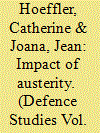

|
|
|
|
|
| Summary/Abstract |
While much scholarship takes austerity-driven spending cuts as evidence of policy change, this paper shifts the focus to interrogate whether these budgetary cuts lead to actual policy change and if so how. Scholarships on institutional change and public policy illuminate how state actors mediate policy change through coping strategies, i.e. strategies by which state actors try to minimize budget decreases’ negative impacts on policy. Taking French Defense Policy as an unlikely case of policy change, we show that state actors have adopted three types of coping strategies to minimize the spending cuts’ impact: compensation, delaying, and re-categorizing acquisition procedures. These coping strategies have however contributed to a process of incremental change, which most of time is non-cumulative and creates additional policy problems. This article contributes to a better understanding of change underway in defense policies, but also more generally to literatures pertaining to austerity and policy change.
|
|
|
|
|
|
|
|
|
|
|
|
|
|
|
|
| 12 |
ID:
109691


|
|
|
|
|
| Publication |
2011.
|
| Summary/Abstract |
The role of policy instruments to promote the development and diffusion of energy efficient technologies has been repeatedly accentuated in the context of climate change and sustainable development. To better understand the impact of policy instruments and to provide insights into technology change, assessments of various kinds are needed. This study analyzes the introduction and development of energy efficient windows in Sweden and the policy incentives applied to support this process. The study focuses on the assessment of technology and market development of energy efficient windows in Sweden; and by applying the concept of learning, it assesses how conditions for learning-by-searching, learning-by-doing, learning-by-using and learning-by-interacting have been supported by different policies. The results show successful progress in technology development and an improvement in best available technology of Swedish windows from 1.8 W/m2 K in the 1970s to 0.7 W/m2 K in 2010; in the same time period the market share of energy efficient windows increased from 20% in 1970 (average U-value of 2.0 W/m2 K) to 80-85% in 2010 (average U-value of 1.3-1.2 W/m2 K). The assessment shows that various policy instruments have facilitated all four learning processes resulting in the acknowledged slow but successful development of energy efficient windows.
|
|
|
|
|
|
|
|
|
|
|
|
|
|
|
|
| 13 |
ID:
112322
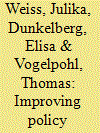

|
|
|
|
|
| Publication |
2012.
|
| Summary/Abstract |
Increasing energy efficiency in residential dwellings remains one of the top climate protection priorities in many European countries. In Germany regulatory instruments and subsidy programs, together with communicative instruments, represent the most important measures for motivating homeowners to pursue energy-efficient retrofitting-to date, however, with little success; a tremendous potential for energy savings still exists particularly in the category of single-family houses. The present article primarily addresses the question of how to improve or supplement the political instruments in order to increase refurbishment rates and tap these potential savings; it presents the results of an analysis of existing policy instruments in Germany focussing on the most promising types of building and refurbishment measures that also takes into account the barriers responsible for the discrepancy between potential and actual refurbishment rates. It is shown that consideration of the specific peculiarities and situations homeowners face, coupled with an analysis of the energy saving potentials of their buildings, offers valuable insights and is critical for evaluating policy instruments and finding the mix of instruments that will purposefully encourage the most effective refurbishment measures. Drawing on these results, recommendations for the improvement of current policy instruments and implementation of new instruments are provided.
|
|
|
|
|
|
|
|
|
|
|
|
|
|
|
|
| 14 |
ID:
127241
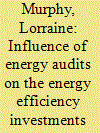

|
|
|
|
|
| Publication |
2014.
|
| Summary/Abstract |
Energy audits are promoted as an effective tool to drive investment in energy efficiency measures in the residential sector. Despite operating in many countries for several decades details of the impact of audits are mixed. The aim of research presented here is to explore the role of audits on investment in energy efficiency measures by private owner-occupied householders in the Netherlands. Results showed that the main influence of the energy audit was to confirm information held by householders. A significant portion of audit recommendations was ignored, the main reason being that householders considered their dwellings to be adequately energy efficient. A comparison of audit recipients to non-recipients showed that audit recipients did not adopt, plan to adopt or invest in more energy efficiency measures than non-recipients. In fact non-recipients adopted more and invested more in measures. It is concluded that energy based renovation is driven by householder perception of comfort and acceptable outlay on energy bills and not necessarily to expert technical tailored information on the potential to reduce CO2 emissions and environmental impact. Results support arguments for minimum energy efficiency standards and performance based incentives.
|
|
|
|
|
|
|
|
|
|
|
|
|
|
|
|
| 15 |
ID:
088282


|
|
|
|
|
| Publication |
2009.
|
| Summary/Abstract |
This article examines the discourse that the idea of efficiency is built upon according to different actors trying to influence households' energy behaviour in Sweden. The focus is on information from authorities as well as from interest organisations and energy companies. Information directed to households often contains a strong idea that the individual has to take responsibility for his/her own choices, and that it is through consumer choices the energy system will become more sustainable. The reasons given for changing one's behaviour are motivated both by lower energy costs and a reduced impact on the environment. Common advice for energy reduction is to change to a more energy-efficient apparatus. In this sense efficiency is a way of not changing lifestyle but instead changing technical equipment and user routines. Only the LA21 project questions the need for all the apparatus as well as the possibility to improve existing artifacts, pointing to a need to change our lifestyle. The strong belief in science and technology results in a definition of the problem as a lack of knowledge, where the only solution is to fill this gap.
|
|
|
|
|
|
|
|
|
|
|
|
|
|
|
|
| 16 |
ID:
126624
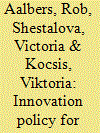

|
|
|
|
|
| Publication |
2013.
|
| Summary/Abstract |
This paper discusses policy instruments for redirecting technical change within the electricity sector to mitigate climate change. First, we unravel the mechanism behind directed technical change, explaining why markets may underprovide innovations in expensive renewable technologies in comparison to innovations in energy-efficient fossil-fuel generators. Subsequently, we characterize technical change in electricity generation technologies, stressing the heterogeneity of knowledge spillovers both within and between clean electricity generation technologies. We argue that there exists a rationale for a portfolio approach to innovation in the electricity sector, i.e., optimal innovation policies are neither fully generic nor fully specific; and they need to be adapted, in response to new information learned by the government. The existing innovation literature does not, however, provide a clear-cut answer for designing such a policy. We compare policy instruments and argue that public R&D support to clean technologies, either in the form of subsidies or prizes, seems to be the prime candidate for implementing non-generic innovation policy.
|
|
|
|
|
|
|
|
|
|
|
|
|
|
|
|
| 17 |
ID:
191168
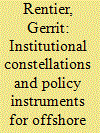

|
|
|
|
|
| Summary/Abstract |
This paper analyses how institutional constellations and their associated mode of risk allocation are reflected in the choice of policy instruments for the promotion of offshore wind power. Using the Varieties of Capitalism framework we expect that governments in Liberal Market Economies (LME) tend to use policy instruments that privatise investments and risk-taking, while those in Coordinated Market Economies (CME) use policy instruments that facilitate investments and shared risk-taking in the earlier, more riskful phase of technological development. We test our expectations through a longitudinal comparative analysis of the use of policy instruments and the deployment of offshore wind power in Denmark, the United Kingdom, Germany and the Netherlands between 1990 and 2020.
|
|
|
|
|
|
|
|
|
|
|
|
|
|
|
|
| 18 |
ID:
166412


|
|
|
|
|
| Summary/Abstract |
What are the determinants of policy choice, and how effective are policies in facilitating the diffusion of clean technologies to developing countries? To answer this question, I create a novel dataset on the adoption of policies to incentivise the diffusion of compact fluorescent lamps (CFL) in 72 low and middle-income countries spanning 1993–2013. The empirical model uses the instrumental variable two-stage least squares (IV-2SLS) methodology to evaluate the effectiveness of policies such as information provision, CFL subsidies and banning the use of incandescent bulbs (IB), and analyses the factors that increase the likelihood of adopting these policies. Results suggest that information provision has had a positive effect on CFL diffusion, while subsidies have had an insignificant effect on diffusion across many countries, and a negative effect in some. The ban on IB is found to not affect CFL diffusion, which attests to the importance of effectiveness in policy implementation. In addition, more effective governments are more likely to provide information, and less likely to subsidise CFL. The results of this paper have important policy implications, given that little is known about how policies work in developing countries, where the greatest potential for cheap emissions abatement lies.
|
|
|
|
|
|
|
|
|
|
|
|
|
|
|
|
| 19 |
ID:
176734


|
|
|
|
|
| Summary/Abstract |
Renewable energy auctions have been lauded for bringing about price reductions. However, the methods applied in investigating such impacts have so far been inadequate and often do not allow conclusions to be drawn as to whether observed price reductions were caused by auctions or by other factors. We have analysed the outcomes of the first onshore wind auctions in Germany held in 2017 and 2018, taking into account the site-specific wind conditions and realisation deadlines of the successfully bid projects. Our results show that after a temporary reduction, prices exceeded both the initial levels and the transitional feed-in tariff. A lack of public acceptance and numerous legal complaints against building permissions have contributed to bids falling below auction volumes in 2018. These results are discussed against the backdrop of the functional and structural promises associated with the introduction of auctions, including reduced remuneration levels, better control of the pace of the capacity expansion and who is able to influence the setting of the remuneration levels.
|
|
|
|
|
|
|
|
|
|
|
|
|
|
|
|
| 20 |
ID:
113457
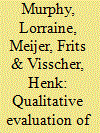

|
|
|
|
|
| Publication |
2012.
|
| Summary/Abstract |
Climate change policies in the Netherlands recognise the importance of existing dwellings. Efforts to gain these energy savings are led at national level by policy instruments such as the Energy Performance Certificate, covenants, economic and information tools. These instruments reflect a policy style described as consensus based and incentivising. However, this approach has been subject to criticism with suggestions that alternatives are required. As a first step towards conceptualising alternatives previous evaluations and stakeholder interviews are used to assess instruments. Elements from the theory based evaluation method combined with concepts from policy instrument and energy policy literature form an evaluation framework. Results demonstrate weak impact of some key instruments. Underlying theories associated with instruments are often lost during implementation or remain unsubstantiated. Policy instrument and energy policy concepts are evident but are far from pervasive. Results show that current instruments are poorly equipped to forge a long-term energy saving strategy for existing dwellings. It is further demonstrated that complexity with existing dwellings is not only limited to frequently cited barriers but to the intricacies of designing and operating a well-orchestrated instrument mix.
|
|
|
|
|
|
|
|
|
|
|
|
|
|
|
|
|
|
|
|
|